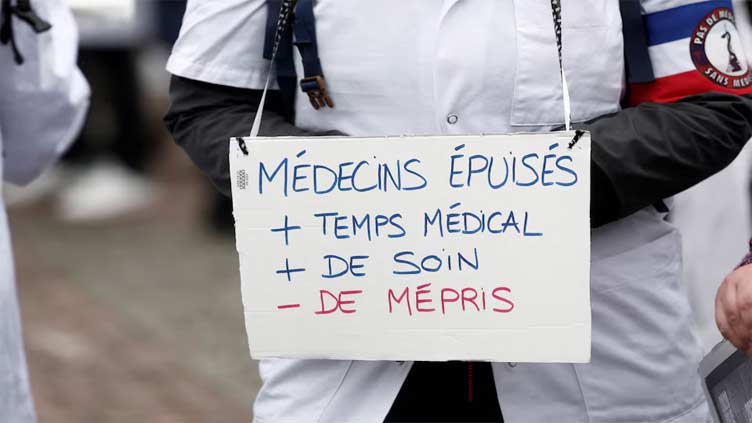France's North African doctors consider emigration with rise of far right

World
RN came top in the first round in France's legislative election last Sunday
PARIS (Reuters) - In the southern French town where Tunisian doctor Tasnime Labiedh works, the far-right National Rally (RN) came top with 41% in the first round of France's election. Now, she's thinking of moving to Switzerland.
"Already we are not spoilt here, but if we have (Jordan) Bardella as prime minister, it will be grim. They play on the fear of the other," said Labiedh, 33, referring to the president of the RN.
She moved to France in 2021 during the COVID-19 pandemic for her medical internship and now works as a microbiologist on a salary lower than that of her French counterparts.
After the RN came top in the first round in France's legislative election last Sunday, some doctors of foreign origin are questioning whether they will stay in a country that they feel does not respect their rights or make them feel welcome.
Polls predict that the RN will win the largest share of seats in parliament but not a majority.
Among 11 doctors of North African origin or nationality interviewed by Reuters, six said they were considering leaving France because of the political situation. One doctor emigrated to Canada a month ago.
With only 3.17 doctors per 1,000 inhabitants, France has the most severe doctor shortage among the OECD countries after Luxembourg. In Labiedh's town, there are 1.73 doctors per 1000 inhabitants.
"We are living in an immense hypocrisy. The far right prospers in France on the subject of immigration, with migrants depicted as a problem. But if migrants stopped working tomorrow our whole social and economic system would be paralysed," Hicham Benaissa, a sociologist with France's national centre for scientific research, the CNRS, told Reuters.
In a study of 350 doctors of North African background in France due to be published next year, Benaissa found that 75% of doctors, including people trained abroad and those born in France, were considering emigrating.
The RN did not respond to requests for comment.
Bardella, the most likely candidate for prime minister should the RN defy the polls and win a working majority, said last month that "our compatriots of foreign nationality or origin who work, pay their taxes, respect the law, and love our country have nothing to fear".
RN leader Marine Le Pen has previously proposed to "drastically reduce" the employment of doctors with qualifications from outside of the EU, and to prioritise French candidates for jobs.
In 2023, 29,238 doctors working in France were trained outside the EU, a 90.5% increase compared to 2010, making up around 7% of the total workforce, according to the National Council of the Order of Doctors (CNOM). North African doctors account for more than half of them.
Doctors with qualifications from outside of the EU have to complete exams and administrative procedures to be registered with the Order of Doctors, which generally takes three to five years. Before this, they are paid less than French doctors.
Widad Abdi, a doctor and representative of the SNPADHUE union for doctors qualified outside of the EU, says that politicians are not dealing with structural problems.
"Whether foreign or not, more and more doctors are leaving - the health system does not encourage them to stay: the working conditions, the pay, the hours, the number of patients has increased and the number of doctors has gone down."
MEDICAL DESERTS
In the first round of the legislative elections, the RN performed better in regions with poor healthcare access, with a correlation rate of -52%, Reuters analysis of the results and data on access to a local doctor showed, an indicator of the party's success in deprived rural areas.
In towns that placed RN candidates in first place, more than a quarter of the population do not have access to a local doctor, compared to 13% in towns that placed President Emmanuel Macron's group first and 8% in towns won by the left-wing alliance.
Improving access to public health services in areas with poor healthcare access, dubbed "medical deserts", is among the RN's campaign pledges.
Foreign doctors, as well as French doctors of immigrant origin, play an essential role in these areas, where the posts are less prestigious than in big city hospitals, says Benaissa.
In Ales in the south of France, half the vote went to the RN. A&E doctor Leila Elamrani, who moved to France from Morocco in 2004, says they feel the pressure in their service which takes patients from surrounding areas.
"People don't have GPs so they come here for a cold, for a doctor's note to take sick leave," she said. "That, plus an ageing population and lack of resources, creates a huge mess."
Lydia Boumaarafi, a French doctor of Algerian heritage specialised in addictology, is not waiting to see what happens. She moved to Canada a month ago in part because of "its approach to multiculturalism".
"The situation is now at a climax (with the RN vote) but the climate has been this way for a while," she said.


